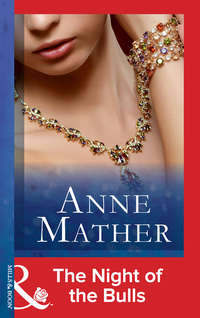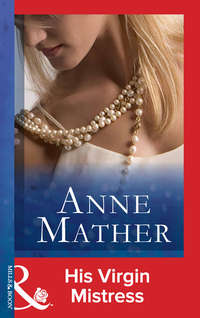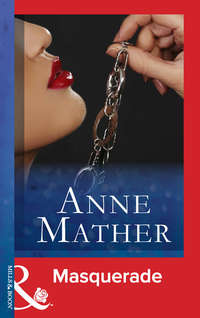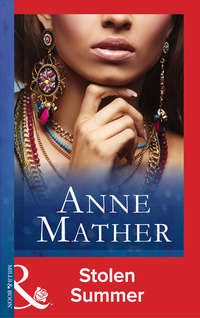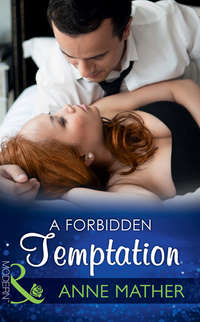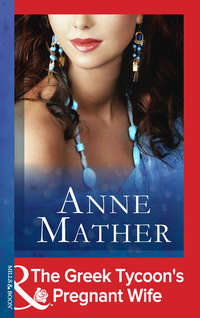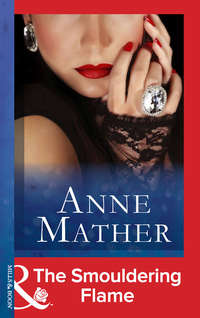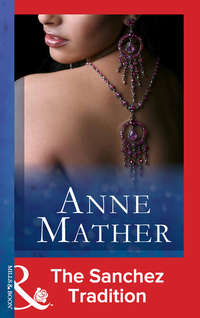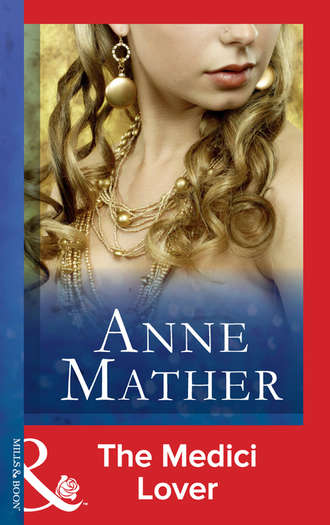
Полная версия
The Medici Lover

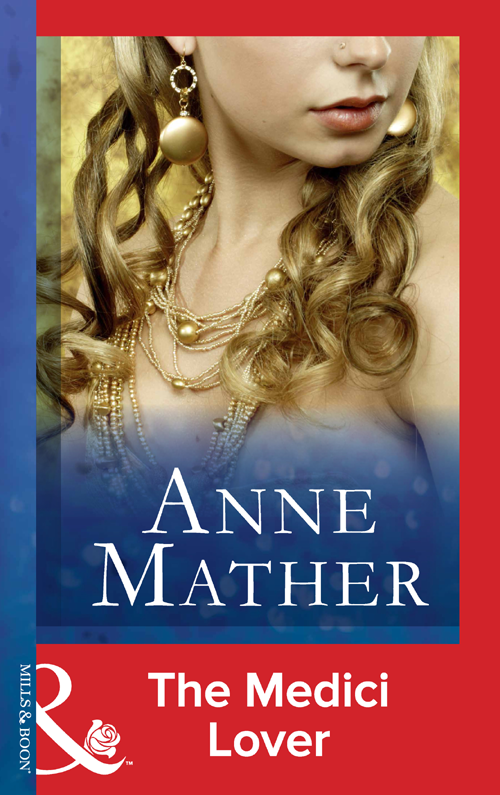
Mills & Boon is proud to present a fabulous collection of fantastic novels by bestselling, much loved author
ANNE MATHER
Anne has a stellar record of achievement within the
publishing industry, having written over one hundred
and sixty books, with worldwide sales of more than
forty-eight MILLION copies in multiple languages.
This amazing collection of classic stories offers a chance
for readers to recapture the pleasure Anne’s powerful,
passionate writing has given.
We are sure you will love them all!
I’ve always wanted to write—which is not to say I’ve always wanted to be a professional writer. On the contrary, for years I only wrote for my own pleasure and it wasn’t until my husband suggested sending one of my stories to a publisher that we put several publishers’ names into a hat and pulled one out. The rest, as they say, is history. And now, one hundred and sixty-two books later, I’m literally—excuse the pun—staggered by what’s happened.
I had written all through my infant and junior years and on into my teens, the stories changing from children’s adventures to torrid gypsy passions. My mother used to gather these manuscripts up from time to time, when my bedroom became too untidy, and dispose of them! In those days, I used not to finish any of the stories and Caroline, my first published novel, was the first I’d ever completed. I was newly married then and my daughter was just a baby, and it was quite a job juggling my household chores and scribbling away in exercise books every chance I got. Not very professional, as you can imagine, but that’s the way it was.
These days, I have a bit more time to devote to my work, but that first love of writing has never changed. I can’t imagine not having a current book on the typewriter—yes, it’s my husband who transcribes everything on to the computer. He’s my partner in both life and work and I depend on his good sense more than I care to admit.
We have two grown-up children, a son and a daughter, and two almost grown-up grandchildren, Abi and Ben. My e-mail address is mystic-am@msn.com and I’d be happy to hear from any of my wonderful readers.
The Medici Lover
Anne Mather

Table of Contents
Cover
About the Author
Title Page
CHAPTER ONE
CHAPTER TWO
CHAPTER THREE
CHAPTER FOUR
CHAPTER FIVE
CHAPTER SIX
CHAPTER SEVEN
CHAPTER EIGHT
CHAPTER NINE
CHAPTER TEN
CHAPTER ELEVEN
Copyright
CHAPTER ONE
EVER SINCE the sleek Trident had circled low over the lagoon before making a smooth landing at Venice’s international airport, Suzanne had been concerned. No, even before that, she conceded silently to herself, watching Pietro’s square hands as they lightly circled the driving wheel of his sports car. And concerned did not seem a strong enough adjective either. Disturbed, anxious—even uneasy might have described her feelings better. For as they drew nearer and nearer Pietro’s home, she became more and more convinced that she should not have given in to the impulse to come.
What did she know of his family, after all? That he had no brothers or sisters, and that his father was dead. More than that he had seemed curiously loath to reveal, and had Suzanne not found the opportunity to get out of London at this time to her advantage, she would probably never even have considered his invitation.
And yet wasn’t she being unnecessarily harsh with herself? After all, she and Pietro were good friends, and although she sensed that he was hoping their friendship might blossom into something more emotional, there was no reason why she should blame herself for a situation which had been of his making.
All the same, in other circumstances she would have thought twice, and possibly three times, before committing herself to several days in the company of people she had never met, and who were not of her own nationality. Just because she could speak the language and had spent several months last year as courier for the company she worked for at their hotel in Rimini, it did not mean she understood the people.
She and Pietro Vitale had only known one another six weeks. At present, she was working in London, employed at the company’s hotel in the West End, and her meeting with the young Italian had been quite coincidental. Later, he had told her he was studying at the London College of Art, but that morning, in the little antique shop in the Portobello Road, he had been just another tourist trying to make himself understood to an uncomprehending assistant. Appreciating his difficulties, Suzanne had automatically intervened, forgetting for the moment her own reasons for entering the shop. The dark-skinned Italian had not been unappreciative of the combination of thickly-lashed brown eyes and streaked honey-blonde hair that swung silkily about Suzanne’s shoulders, but eventually, between them, they had made the assistant understand that he wanted to price a bronze figurine of the Virgin and Child. He wanted it as a present for his mother, he said, but it had been too expensive and he had had to decline. Afterwards, it had been natural for him to invite her to have coffee with him, and Suzanne had accepted, more out of sympathy for him than a longing to further their acquaintance. But sitting in the coffee shop only a few yards away, she had seen the sleek Mercedes, which had driven her to take refuge in the antique shop in the first place, cruising by on the opposite side of the road, and had felt more relaxed than she had done for weeks.
Pietro had proved to be an entertaining companion, and when he had suggested a second meeting, she had agreed. If her motives had more to do with the cruising Mercedes and less with a genuine desire to go out with him, she excused herself on the grounds that Pietro had invited her, and would have been disappointed if she had refused.
Even so, going back to the hotel in a cab which Pietro had hailed for her, she had had misgivings, and not until Abdul Fezik came storming into her office late that afternoon had she felt that her behaviour had been justified. Now, at least, she had a genuine reason for refusing the Turk’s persistent invitations, a means to divert his attentions, with luck, towards some other member of her sex. He was a powerful and wealthy man, not used to being thwarted when it came to women, particularly not women who had to work for a living.
Suzanne, however, had had surprisingly little to do with men. From an early age, she had learned that her looks might well prove to be an obstacle in her determination to carve a career for herself. Prospective employers tended to regard attractive girls in one of two ways: either predatorily, or suspiciously; on the one hand seeking the kind of relationship Suzanne was determined to avoid, or on the other, assuming she required employment only so long as it took her to find a suitable husband. The situation infuriated Suzanne, who, having seen her own parents’ marriage break up, had no intention of making the same mistakes herself.
Surprisingly though, since she came to work for the Minotaur Group three years ago, these problems had largely been avoided. Of course, that might be because she had spent so little time, comparatively speaking, in one place. During the past three years she had worked in several different countries, and at twenty-four was considered one of the company’s most successful executives. Nicolai Stassis, the elderly Greek who had founded the organisation, had none of his countrymen’s contempt for women, and judged his staff on their ability, not their sex. That was why she objected so strongly to Abdul Fezik’s chauvinist attitude, his assumption that because she was female, she needed masculine companionship. Pietro—at that time she had not even known his surname—had seemed the answer to a prayer.
But she ought to have known that nothing was ever that simple. Pietro was not a puppet she could pull about at her own convenience, no more than Abdul Fezik could be deterred by the supposed presence of a rival. Fezik was an arrogant man, working in London for his government and living at the hotel, and Suzanne was aware that hardly anything she did went unnoticed. She sometimes wondered when he found the time to attend to his own affairs, so intent did he seem on hers. She guessed what intrigued him, of course. He was a handsome man, if a little inclined to overweight; he had money and position, almost everything a girl in her position might wish for. He couldn’t accept that she did not find him as attractive as he seemed to find himself.
Her relationship with Pietro, however, was not totally one-sided. As she got to know him better, she began to enjoy his undemanding company, his gentleness, his courtesy, his sense of humour. His interest in art stemmed, he told her, from a love of beautiful things, and although he told her little about his home life, she gathered that he knew quite a lot about his own country’s heritage. He was obviously not a wealthy man—his clothes were always clean and serviceable, but they were worn in places, the elbows of his jackets patched with leather. And yet, he had a certain air about him at times which was strangely out of keeping with his appearance, and Suzanne had to curb her desire to question him about his background. It was nothing to do with her, she had told herself on these occasions. No matter how likeable Pietro was, he aroused little but her affection, and a curious sense of compassion for his diffidence.
When he told her he was going home to Italy for ten days at Easter, Suzanne had not immediately considered what his absence might mean to her. In the few weeks they had known one another he had heard about her parents’ divorce and her father’s subsequent death in a motor accident. Her mother had married again, but it was not a happy liaison either, and Suzanne’s contact with the woman who had borne her was limited to occasional lunches when her mother came up from Bristol for a day’s shopping. Since Suzanne’s work often kept her out of the country for months at a time, she could not blame her mother for their estrangement, and nowadays they seemed to have little to say to one another. Annabel moved in a different world from that of her daughter, and had never desired independence as her daughter did.
Nevertheless, when Pietro suggested that Suzanne should come home with him for the holiday, the idea of a family occasion had had some appeal. Granted his family was not her family, but if his mother was anything like Pietro himself then she would no doubt be a charming lady. And she was free for the weekend at least …
Even so, she had demurred, insisting that she could not accept such an invitation after such a brief acquaintance. Pietro had protested that he could write to his mother and have her invite Suzanne personally, but still she had refused. Apart from anything else, she was not the sort of girl to agree to spend ten days with a young man she knew practically nothing about, however ingenuous he might seem.
But again fate had taken a hand in the person of Abdul Fezik. Three days after Pietro’s invitation, the hotel manager sent for Suzanne. He had a request to make of her, he had said, half reluctantly she had felt, immediately apprehensive. He had been approached, he went on, by one of their guests, Mr Fezik, who intended holding a reception in the hotel during the Bank Holiday weekend. Mr Fezik needed someone to act as his hostess at the reception, and had suggested that perhaps Suzanne might be persuaded to accept.
Once again, Suzanne had been staggered by the man’s audacity. After everything that had gone before he still would not believe that sooner or later she would not succumb to his personality. Before she knew what she was saying, she had informed the manager that regretfully she could not accept Mr Fezik’s invitation, that she had already made arrangements for the weekend, that she was spending Easter in Italy with her boy-friend’s family.
Surprisingly, the manager had seemed slightly relieved. Perhaps, contrary to Suzanne’s beliefs, he had been aware of what was going on. In any event, he accepted her apologies with a smile, and assured her that she had no need to consider altering her arrangements.
Pietro had naturally been delighted when she had told him she had changed her mind about coming to Italy, but affronted when she suggested it might be better if she stayed at an hotel.
‘Castelfalcone is just a village,’ he had protested, in his heavily accented English. ‘There is no hotel—just the pensione. It would not be right for a guest of my family to stay at the pensione.’
And so Suzanne had acquiesced. It was only a few days, after all. She had to return to London the following Tuesday. As they were flying out on Thursday, it was only a matter of four days.
Nevertheless, as the aircraft carrying them to Venice took off from London’s Heathrow Airport, the ambiguity of her position began to make Suzanne uneasy. Pietro had told her that he had written to his mother, but not what he had said, and she couldn’t help wondering whether he had implied a relationship between them that stemmed more from his imagination than reality. What if his mother questioned their association, what could she say? What would Pietro say?
Pietro’s small sports car had been waiting for him at the airport. They had cleared passport control and Customs with the minimum amount of fuss, and emerged into the mild afternoon air, feeling the weight of their heavy clothes. The sky was vaguely overcast, but the light was brilliant, making Suzanne grope for her dark glasses in her bulky handbag.
Watching the other passengers making for the motorboats and buses made Suzanne wish they were staying in Venice. How much simpler it would have been to book in anonymously at some hotel, without the daunting prospect of facing Pietro’s unknown relatives.
They drove north, leaving the canals and campaniles of the city behind. The autostrada was busy with holiday traffic, and Suzanne, who had never driven with Pietro before, was alarmed by his reckless disregard for other motorists. He was obviously one of those men who assumed a different character behind the wheel, and her palms were moist and she was reassessing her opinion of him when they turned off the autostrada on to a narrower, rougher road.
In an effort to divert him and herself, Suzanne allowed herself the privilege of asking questions she had hitherto avoided. ‘Do you and your mother live alone?’ she queried tentatively, speaking in Italian to make it easier for him.
Pietro took a few moments before replying, pretending to concentrate on passing a farm cart drawn by a pair of rather tired-looking oxen, but eventually he said: ‘No. We live in the house of my cousin.’
‘Your cousin?’ Suzanne’s dark eyebrows arched.
Pietro nodded, his hands tightening on the steering wheel. ‘I told you, Suzanne—my father died some years ago.’
‘Well, yes …’ Suzanne considered the situation. ‘And your cousin lives at Castelfalcone.’
‘That is correct.’
Suzanne drew her lower lip between her teeth, wishing he would be a little more forthcoming. ‘Your—er—cousin is married?’ she probed, and Pietro nodded once more.
Suzanne tried to picture the household. She knew Italians held very strongly to the family ideal, but two women running a home was seldom successful. What was Pietro’s mother’s position in the household? Were there children? Was she her nephew’s housekeeper, or nursemaid to his children? Did other members of the Vitale family live in the house? Suzanne wished she had asked some of these questions before leaving London.
‘What—what does your cousin do?’ she queried unwillingly, and was surprised at the look of bitterness which crossed Pietro’s face.
‘Do?’ he echoed. ‘What do you mean—what does he do?’
Suzanne, who had thought the question quite a simple one, shook her head. ‘I meant—what is his occupation?’ she explained swiftly. ‘I presume he does have one, doesn’t he?’
Pietro glanced sideways at her. ‘My cousin is disabled,’ he stated harshly. ‘He had an accident three years ago.’
‘Oh!’ Suzanne wished she had never asked the question. She felt as if she had intruded into some personal tragedy, although there was curiously little sympathy in Pietro’s voice. ‘I’m sorry.’
Pietro shrugged. ‘These things happen. Mazzaro is lucky to be alive.’
‘Mazzaro? That’s your cousin’s name?’
‘Mazzaro di Falcone, yes.’
‘Falcone?’ Suzanne couldn’t prevent the ejaculation. ‘But …’ She paused. ‘I assumed his name would be the same as yours.’
‘No.’ Pietro shook his head. ‘Mazzaro’s father was my mother’s brother.’
‘I see.’
Suzanne stared out at the countryside through which they were passing. A fugitive gleam of sunlight was gilding the spire of a church she could see high up on the hillside. They were in rugged country, presently following a route that traced the winding course of a stream before rising to overlook the valley, rich with fields of ripening grain. They had passed through several villages, hamlets mostly, and ahead of them were rising the ascending plateaux of the Alps, snow-capped and magnificent, their pine-clad slopes the home of marmot and wild deer.
It was beautiful country, but Suzanne was paying little attention to the scenery. Something about Pietro’s cousin’s name was familiar, and it took her several minutes to realise it was the same as the village. Or almost. Castelfalcone … Falcone.
‘Pietro—’ she began, only to have him interrupt her by asking whether she was hungry or tired, explaining that it was not much further now. His smile attempted to reassure her, and Suzanne shrugged, defeated. She would, without doubt, learn soon enough why Pietro should choose to be so reticent about his family.
Castelfalcone reminded Suzanne a little of San Marino. Like the tiny republic perched high on its mountain, Castelfalcone was a fortified community, surrounded by crenellated walls and towers, with an encircling moat of water. It was entered by one of two arched gateways, its narrow streets and arcades redolent with history. A cobbled square, the Piazza della Cortina, Pietro told her it was called, seemed the focal point of the village, and there were plenty of people still about, enjoying the cool evening air. The doors of a trattoria stood wide and outside people were sitting at tables which in the heat of the day could be shaded by their striped umbrellas. Trees framed the piazza, some already dripping with blossom.
‘It’s beautiful!’
Suzanne spoke involuntarily, and Pietro looked pleased. ‘Yes, it is,’ he agreed, casting a smiling glance in her direction. ‘We get many tourists in the season.’
Suzanne glanced round as they circled the square and entered a narrow thoroughfare leading up out of the village. ‘Where does your cousin live?’ she asked frowning, and silently, Pietro gestured to a sign set at the side of the road just ahead of them. It read simply: ‘Villa Falcone’ with an arrow directing the motorist up a steep incline. Suzanne looked up, but all she could see was stone walls from this angle, and unknowingly she held her breath as Pietro swung across the road and accelerated swiftly up the tree-lined approach to tall iron gates.
She could see the villa through the gates as Pietro went to open them, and her breathing quickened uncontrollably. She did not need to see the family crest decorating the twenty-feet-high gates to know that somehow she had got herself invited to one of Italy’s stately homes, although in her experience wealthy men did not advertise themselves as that sign appeared to do down below them.
Pietro returned and got into the car, and she turned to him half impatiently. ‘Why didn’t you tell me?’ she exclaimed, but he was putting the car into gear and would not look at her.
‘Would you have come if I had?’ he countered.
‘Probably not.’
‘That’s what I thought.’
‘But, Pietro, can’t you see? I can’t stay here!’
‘Why not?’ He had halted the car inside the gates and was waiting to get out to close them.
‘You know why not. Pietro, if this is your cousin’s home—’ She sighed. ‘Surely you understand.’
He looked at her then. ‘Suzanne, do not concern yourself. My cousin does not have a lot of money, if that is what is worrying you.’
‘He must have!’
‘No.’ Pietro shook his head. ‘Suzanne, do you think your country is the only country to suffer from inflation and taxation? We have suffered, too. We are still suffering. There are few Italians with money today.’
‘But—this place …’
Pietro shrugged. ‘What you are looking at, Suzanne, is a—museum, no? Rooms full of furniture and paintings, cases of china and glass, goblets and medallions, shelves of books which will never be read. A mausoleum would have more life! And in a few weeks tourists will come. They will be conducted around the Villa Falcone by my mother. They will buy a guide book, and we hope a souvenir to remind them of their visit. Now do you understand?’
Suzanne understood what he was saying, but not the tone in which he was saying it. The contempt in Pietro’s voice was something she had not heard before.
‘But—but surely the paintings you mentioned—and other things—they must be valuable?’
‘No doubt.’
‘Then why doesn’t—I mean, I know there’s a great demand for such things today.’
Pietro stared ludicrously at her, affecting horror at her words. ‘Suzanne! What you are suggesting is—blasphemous! Outrageous! Sacrilegious!’
The mockery in his voice made her draw in her lips. ‘I gather your cousin does not want to sell,’ she said flatly.
‘You gather correctly.’ Pietro vaulted out of the car. ‘Excuse me.’
When he came back after closing the tall gates, the mockery had disappeared. Instead, he apologised as he got into the car, giving her a rather shamefaced smile.
‘I am afraid I allow my cousin’s selfishness to upset me at times,’ he said. ‘Forgive me. I am not normally so impolite.’ He sighed. ‘No doubt, you are wondering where we live. Well, we occupy the west wing at the back of the villa. You will see it is built on three sides of enclosed square, with a loggia where one can sit on hot days. There is a fountain in the square, and the sound of running water is delightful. I am sure you will like it.’
Suzanne wished she felt as confident. The long, south-facing portico of the villa was magnificent, of course. No one could fail to admire its classical lines, the stone façade inlaid with variegated marble, creating a pattern of light and dark over the entire building. But staying in such a place was something else. And if Pietro disliked his cousin so much, why did he stay?
They drove beneath an archway, overhung with vines, and along a tree-shaded avenue at the side of the villa, until Pietro drew up in a stone-flagged courtyard, flanked by garages and stables and various other outbuildings. An elderly man emerged from one of the buildings at their approach, but his greeting was barely civil when he recognised the car. Considering Pietro had been away for several weeks at least, Suzanne thought his welcome was less than enthusiastic. But Pietro seemed not to notice, hoisting their suitcases out of the back of the car, and bidding Suzanne to follow him.


